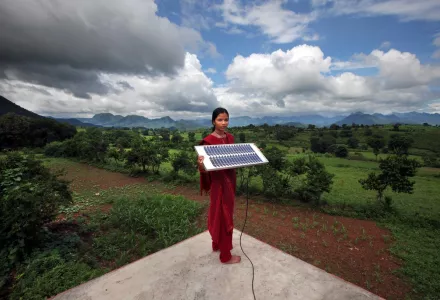Speakers:
- Mr. Ajay Kumar Bhalla, Secretary, Ministry of Power, Government of India
- Dr. Ajay Mathur, Director General, The Energy and Resources Institute, New Delhi; India
- Prof. Johannes Urpelainen, Founding Director, Initiative for Sustainable Energy Policy (ISEP), Johns Hopkins University, Washington D.C.
- Mr. Ranjit Bharvirkar, Principal and India Program Director, Regulatory Assistance Project, Vermont
Moderated by Professor John P. Holdren, Co-Director, Science, Technology, and Public Policy Program
The seminar will begin with an introduction of the Science, Technology, & Public Policy Program and its focus on India's energy decarbonization and then each speaker will present for 15 minutes. This will be followed by a panel discussion and question and answer session moderated by Prof. John P. Holdren.
India is the world's third-largest emitter of carbon dioxide, with energy use being the largest contributor to these emissions. At the same time, millions of people remain without electricity access in India. By the middle of the 21st century—at around 1.66 billion people—India will be the most populous nation in the world, with almost as many people as both China and the United States combined (UNDP 2017). By then India will also be among the world's top three economies (OECD 2018). The IEA projects that until 2040 the largest demand growth will come from India, accounting for 11 percent of the world's total energy consumption. Clearly, the pathway taken by the energy sector, and its carbon intensity, will have enormous implications for the citizens of India as well as the world.
Yet, despite the recent major push towards renewables, coal remains India's mainstay, providing more than 70 percent of India's electricity generation today. Generation from coal is only expected to plateau at best, without the advent of alternative technologies that are low-carbon and flexible. In addition, for renewables to become technically and economically viable as their share increases, flexible resources are essential. Renewables therefore, are not sufficient in the long run. Unfortunately, there has been little discussion on the decarbonization of India's energy sector beyond renewables.
What technology, policy, and market design initiatives are necessary to create long-term investments in the energy sector that meet India's development, economic, and environmental goals?
Coffee & Tea will be provided.
Co-sponsored by the Consortium of Energy Policy Research



